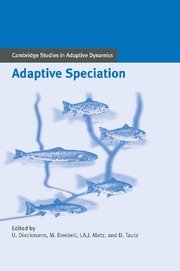Book contents
- Frontmatter
- Contents
- Contributing Authors
- Acknowledgments
- Notational Standards
- 1 Introduction
- 2 Speciation in Historical Perspective
- A Theories of Speciation
- B Ecological Mechanisms of Speciation
- 8 Speciation and Radiation in African Haplochromine Cichlids
- 9 Natural Selection and Ecological Speciation in Sticklebacks
- 10 Adaptive Speciation in Northern Freshwater Fishes
- 11 Sympatric Speciation in Insects
- 12 Adaptive Speciation in Agricultural Pests
- 13 Ecological Speciation in Flowering Plants
- 14 Experiments on Adaptation and Divergence in Bacterial Populations
- C Patterns of Speciation
- References
- Index
12 - Adaptive Speciation in Agricultural Pests
Published online by Cambridge University Press: 05 July 2014
- Frontmatter
- Contents
- Contributing Authors
- Acknowledgments
- Notational Standards
- 1 Introduction
- 2 Speciation in Historical Perspective
- A Theories of Speciation
- B Ecological Mechanisms of Speciation
- 8 Speciation and Radiation in African Haplochromine Cichlids
- 9 Natural Selection and Ecological Speciation in Sticklebacks
- 10 Adaptive Speciation in Northern Freshwater Fishes
- 11 Sympatric Speciation in Insects
- 12 Adaptive Speciation in Agricultural Pests
- 13 Ecological Speciation in Flowering Plants
- 14 Experiments on Adaptation and Divergence in Bacterial Populations
- C Patterns of Speciation
- References
- Index
Summary
Introduction
Agricultural crops provide an ideal environment for adaptive speciation of pest species. They represent recently colonized habitats, harbor small incipient pest populations, and form environments in which not all the resources are already occupied [together referred to as ecological opportunity, see Schluter (2000)]. These characteristics exactly meet the conditions predicted by Dieckmann and Doebeli (1999) to favor species that split into specialists by the process of evolutionary branching (see Chapters 4 and 5). Additionally, in agricultural systems the ecological environment is constant relative to the natural world, which also favors adaptive speciation. Moreover, the economic importance of agricultural crops warrants extensive research into pest species, which increases the probability that adaptive speciation will be documented. It is therefore not surprising that the best examples of ecological speciation in sympatry involve pest species [e.g., the apple maggot fly Rhagoletis pomonella (Feder 1998), the pea aphid Acyrthosiphon pisum (Via 1999), and the two-spotted spider mite Tetranychus urticae (Gotoh et al. 1993)].
Agriculture provides a diversity of crops, and plant breeding creates a unique level of heterogeneity in both resistance and palatability within a crop species. In this world, pest species may evolve to become specialists (feeding on one or a few plant species, or even genotypes) or generalists, depending on fitness tradeoffs (Levins 1962; Egas et al., in press; Egas et al., unpublished). Such tradeoffs may be found in food conversion efficiency, detoxification, phenology, and defenses against or escape from natural enemies.
- Type
- Chapter
- Information
- Adaptive Speciation , pp. 249 - 263Publisher: Cambridge University PressPrint publication year: 2004
- 5
- Cited by



